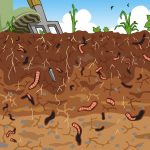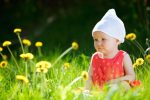 As an organic gardener and homesteader one of the most effective things you can do for your garden and the surrounding environment is encourage more pollinators to make themselves right at home. Hummingbirds, butterflies, bees, bats, and other beneficial critters play an important role in the overall health and well being of your land and garden. In fact, a large population of pollinators in an area is a good indication that the surrounding environment is healthy and thriving.
As an organic gardener and homesteader one of the most effective things you can do for your garden and the surrounding environment is encourage more pollinators to make themselves right at home. Hummingbirds, butterflies, bees, bats, and other beneficial critters play an important role in the overall health and well being of your land and garden. In fact, a large population of pollinators in an area is a good indication that the surrounding environment is healthy and thriving.
Sadly it can be challenging to attract enough pollinators to your property. However, there are several things you can do to make your land more hospitable and pollinator friendly…
Here are four ways to attract more pollinators to your garden:
#1: Eliminate Toxic Pesticides and Herbicides
As an organic gardener (I hope), you are already doing one of the most important things you can do to attract more pollinators into your garden. You are not killing them with nasty chemicals! Many pesticides and weed killers harm the beneficial insects and creatures you are trying to attract for beautiful flowers and a bountiful food harvest. The full impact of their use on living creatures and the environment is not yet fully understood, but more and more research is now showing there is a strong cause for alarm. Just think about the collapse of bee colonies and you know there is a serious problem.
Organic and natuural gardening practices, on the other hand, help create a welcoming environment for these beneficial creatures and make it easier for them to thrive in your garden.
#2: Plant the Right Flowers
Pollinators prefer some flowers over others. Brightly colors blooms and bell shaped flowers are favored by hummingbirds and honey bees alike. Sunflowers, salvia, bee balm, butterfly bush, butterfly weed, and blanket flower are just a few examples of the many beautiful flowers you can grow in or near your garden to help attract more pollinators.
When in doubt, plants native to your area are always a good choice. A quick online search of “native plants in my area” will help you identify good candidates for your own garden. You can also visit a local botanical garden to get advice. Try to incorporate a diverse mixture of pollinator-friendly blooms into your garden to attract a wider variety of beneficial creatures.
Milkweed is one plant you should definitely consider planting because it is the sole food source for Monarch butterflies. With the natural habitat for milkweed dwindling, these beautiful butterflies can use all the extra help they can get. Oh and milkweed smells amazing!
#3: Offer Shelter
You can also attract bees, butterflies, and other pollinators to your garden by offering adequate shelter for them. Different pollinators have different nesting and habitat requirements, so do a little research to identify what works best for the beneficial creatures you want to attract. Offering shelter to pollinators doesn’t need to be overly complicated, however. Something as simple as allowing a log to decompose on your property or strategically placing artificial bee houses and bug hotels around your garden should help.
#4 Provide Food & Water
Planting plenty of brightly colored native flowers will help attract more pollinators to your garden, but you can also take it a step further. For example, you can set up hummingbird feeders to help attract more butterflies and hummingbirds to your property. These pollinators will be happy to return repeatedly as long as you provide a dependable source of food for them. I love this mason jar bird feeder. You can also set up birdbaths, a water fountain, or even a shallow catch basin for rainwater to attract different types of butterflies, moths, and bees with a continuous supply of clean water. Just be sure to rinse out standing sources of water regularly to keep the local mosquito population in check.
Also do not be so quick to pull dandelions or other early flowers for the sake of a tidy yard. These early spring flowers might be a weed to you but for bees they are the first food of spring.
Try these tips and start welcoming your new and very beneficial guests.





